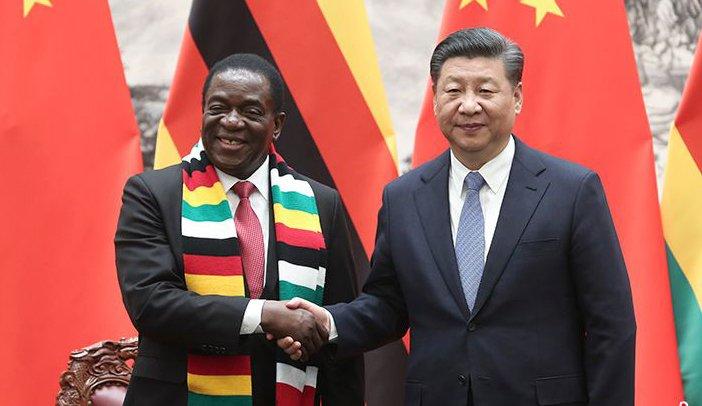News / National
Zimbabwe eyes China's $50 billion African modernisation fund
09 Nov 2024 at 17:08hrs |
0 Views

Zimbabwe is gearing up to tap into a US$50 billion fund that China pledged to support Africa's modernisation and industrialisation efforts during the recent Forum on China-Africa Cooperation (FOCAC) Summit held in September in Beijing. The country will soon submit a list of priority projects to the Chinese government, seeking to leverage this financial package to accelerate key development initiatives.
President Emmerson Mnangagwa attended the FOCAC Summit and had previously engaged in a State Visit to China in late August, at the invitation of Chinese President Xi Jinping. The high-profile visit strengthened Sino-Zimbabwean ties, resulting in 17 agreements that set the stage for potential funding in various sectors.
The Acting Foreign Affairs and International Trade Permanent Secretary, Mrs. Petronella Nyagura, confirmed that an inter-ministerial meeting is scheduled for November 11 to finalise priority projects for submission. "The President's successful visit to China injected fresh impetus into the Sino-Zimbabwe bilateral relations, and there is tremendous scope to build on the positive momentum generated from his engagements," Mrs. Nyagura stated. "The objective of the meeting is to identify and prioritise projects that will be submitted to the Chinese Government for possible funding."
Among the 17 agreements reached during President Mnangagwa's State Visit were several memoranda of understanding (MoUs) designed to bolster trade, investment, and infrastructural collaboration. Key MoUs include the establishment of an Investment and Cooperation Working Group, a Cooperation Plan on Synergising the Belt and Road Initiative with Zimbabwe's Vision 2030, and protocols for exporting Zimbabwean products, such as fresh avocado, to China.
Other signed agreements covered mutual legal assistance, media cooperation, and shared projects in areas like mining and infrastructure. These agreements set a solid foundation for the projects Zimbabwe will submit under the FOCAC funding framework and the Belt and Road Initiative.
Mrs. Nyagura highlighted that the government's focus will be on bankable projects aligned with strategic frameworks like the FOCAC framework, Belt and Road Initiative (BRI), and China's Global Development Initiative (GDI). Projects are expected to address areas critical to Zimbabwe's Vision 2030 goals, including mining, infrastructure, agriculture, and energy.
The proposed projects also include enhanced media and cultural exchanges between Harare and Beijing. Agreements signed between Zimbabwe and China in this area include an MoU on Media Exchange, an MoU between China Media Group and the Ministry of Information, and a collaboration agreement between Xinhua News Agency and New Ziana.
The targeted Chinese funding, together with the agreements signed, promises to boost Zimbabwe's development efforts, reinforcing partnerships in critical sectors and bringing the country closer to achieving its long-term goals for national growth and prosperity.
President Emmerson Mnangagwa attended the FOCAC Summit and had previously engaged in a State Visit to China in late August, at the invitation of Chinese President Xi Jinping. The high-profile visit strengthened Sino-Zimbabwean ties, resulting in 17 agreements that set the stage for potential funding in various sectors.
The Acting Foreign Affairs and International Trade Permanent Secretary, Mrs. Petronella Nyagura, confirmed that an inter-ministerial meeting is scheduled for November 11 to finalise priority projects for submission. "The President's successful visit to China injected fresh impetus into the Sino-Zimbabwe bilateral relations, and there is tremendous scope to build on the positive momentum generated from his engagements," Mrs. Nyagura stated. "The objective of the meeting is to identify and prioritise projects that will be submitted to the Chinese Government for possible funding."
Among the 17 agreements reached during President Mnangagwa's State Visit were several memoranda of understanding (MoUs) designed to bolster trade, investment, and infrastructural collaboration. Key MoUs include the establishment of an Investment and Cooperation Working Group, a Cooperation Plan on Synergising the Belt and Road Initiative with Zimbabwe's Vision 2030, and protocols for exporting Zimbabwean products, such as fresh avocado, to China.
Other signed agreements covered mutual legal assistance, media cooperation, and shared projects in areas like mining and infrastructure. These agreements set a solid foundation for the projects Zimbabwe will submit under the FOCAC funding framework and the Belt and Road Initiative.
Mrs. Nyagura highlighted that the government's focus will be on bankable projects aligned with strategic frameworks like the FOCAC framework, Belt and Road Initiative (BRI), and China's Global Development Initiative (GDI). Projects are expected to address areas critical to Zimbabwe's Vision 2030 goals, including mining, infrastructure, agriculture, and energy.
The proposed projects also include enhanced media and cultural exchanges between Harare and Beijing. Agreements signed between Zimbabwe and China in this area include an MoU on Media Exchange, an MoU between China Media Group and the Ministry of Information, and a collaboration agreement between Xinhua News Agency and New Ziana.
The targeted Chinese funding, together with the agreements signed, promises to boost Zimbabwe's development efforts, reinforcing partnerships in critical sectors and bringing the country closer to achieving its long-term goals for national growth and prosperity.
Source - The Herald
Join the discussion
Loading comments…


































